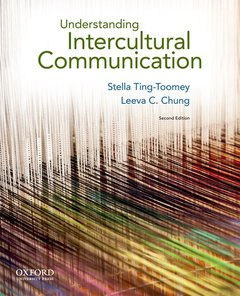Understanding intercultural communication (2nd Ed.)
Langue : Anglais
Auteurs : Ting-Toomey Stella, Chung Leeva

Written in a conversational style, this book introduces students to the foundations of intercultural communication, a vibrant discipline within the field. Authors Stella Ting-Toomey and Leeva Chung take a multicontextual, inclusive approach that balances international and intercultural communication issues against U.S. domestic diversity issues. In addition to emphasizing a value-oriented perspective on intercultural encounters, the text contains a robust ethical chapter, complete with specific guidelines that will help students become ethical intercultural communicators. By integrating current empirical research with lively intercultural examples, the authors ask thought-provoking questions and pose ethical dilemmas for students to ponder. The text offers a sprawling treatment of such topics as ethnic and cultural identity change, culture shock and intercultural adjustment, romantic relationships and raising bicultural children, global identity challenges, and decision-making choices in intercultural ethics. NEW TO THIS EDITION: * Two new special features, "Blog Pic" and "Blog Post," which update all the photos and poignant personal stories found throughout the first edition * A greater focus on the impact of technology on intercultural communication message exchange processes * An updated discussion of multiracial and biracial identity in Chapter 4 * Updates to the popular "Jeopardy Boxes" BL More than 250 new references * "Live-chat," a special boxed feature, which emphasizes the importance of adaptive code-switching in managing intercultural misunderstanding via lively dialogue
Dedication Page. Preface. Acknowledgments. About the Authors. Part One: Fundamental Concepts in Intercultural Communication. 1: Why Study Intercultural Communication?. Practical Reasons to Study Intercultural Communication. Adjusting to Global Workplace Heterogeneity. Adapting to Domestic Workforce Diversity. Engaging in Creative Multicultural Problem Solving. Comprehending the Role of Technology in Global Communication. Facilitating Better Multicultural Health Care Communication. Enhancing Intercultural Relationship Satisfaction. Fostering Global and Intrapersonal Peace. Deepening Cultural Self-Awareness and Other-Awareness. Culture: A Learned Meaning System. Surface-Level Culture: Popular Culture. Intermediate-Level Culture: Symbols, Meanings, and Norms. Deep-Level Culture: Traditions, Beliefs, and Values. Stamping Your Intercultural Passport. 2: What Is Intercultural Communication Flexibility?. Defining Intercultural Communication: A Process Model. Intercultural Communication Process: Overall Characteristics. Intercultural Communication: Meaning Characteristics. Practicing Intercultural Communication Flexibility. Three Content Components: Knowledge, Attitude, and Skills. Three Criteria: Appropriateness, Effectiveness, and Adaptability. Developing Intercultural Communication Flexibility. A Staircase Model. An Essential Hook: A Mindful Perspective. Deepening Intercultural Process Thinking. Process Consciousness: Underlying Principles. Intercultural Reality Check: Do-Ables. 3: What Are the Essential Cultural Value Patterns?. Functions of Cultural Values. Analyzing Cultural Values. Identity Meaning Function. Explanatory Function. Motivational Function. Ingroup-Outgroup Evaluative Function. Analyzing Cultural Value Dimensions. Discovering Cultural Values. Identity: Individualism-Collectivism Value Pattern. Power: Small-Large Power Distance Value Pattern. Uncertainty: Weak-Strong Uncertainty Avoidance Value Pattern. Sex Roles: Feminine-Masculine Value Pattern. Additional Value Orientation Patterns. Value Orientations: Background Information. Meaning: Activity Value Orientation. Destiny: People-Nature Value Orientation. Time: Temporal Value Orientation. Individual Socialization Development. Independent Versus Interdependent Self-Construal. Horizontal Versus Vertical Self-Construal. Internal Versus External Locus of Control. Intercultural Reality Check: Do-Ables. 4: What Are the Keys to Understanding Cultural and Ethnic Identities?. Family and Gender Socialization. Families Come in Different Shapes. Gender Socialization and Interaction Patterns. Group Membership: Intercultural Boundary Crossing. The Process of Acculturation and Enculturation. Systems-Level Factors. Individual-Level Factors. F2F and Network-Level Factors. Mass Media-Level Factors. Group Affiliation and Identity Formation. Cultural Identity Conceptualization. Ethnic Identity Conceptualization. Ethnic/Racial Identity Change Process. Cultural-Ethnic Identity Typological Model. Racial-Ethnic Identity Development Model. Multiracial and Biracial Identity. Intercultural Reality Check: Do-Ables. Part Two: Crossing Cultural and Communication Boundaries Adap
California State University, FullertonUniversity of San Diego
Date de parution : 01-2012
Ouvrage de 384 p.
20x23.7 cm
Disponible chez l'éditeur (délai d'approvisionnement : 14 jours).
Prix indicatif 90,85 €
Ajouter au panierThème d’Understanding intercultural communication :
© 2024 LAVOISIER S.A.S.
